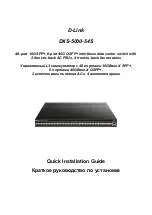
C
HAPTER
6
| VLAN Configuration
IEEE 802.1Q Tunneling
– 172 –
6.
Configure the QinQ tunnel uplink port to Tunnel Uplink mode (see
"Adding an Interface to a QinQ Tunnel" on page 173
).
7.
Configure the QinQ tunnel uplink port to join the SPVLAN as a tagged
member (see
"Adding Static Members to VLANs" on page 160
).
E
NABLING
Q
IN
Q
T
UNNELING
ON
THE
S
WITCH
Use the VLAN > Tunnel (Configure Global) page to configure the switch to
operate in IEEE 802.1Q (QinQ) tunneling mode, which is used for passing
Layer 2 traffic across a service provider’s metropolitan area network. You
can also globally set the Tag Protocol Identifier (TPID) value of the tunnel
port if the attached client is using a nonstandard 2-byte ethertype to
identify 802.1Q tagged frames.
CLI R
EFERENCES
◆
"Configuring IEEE 802.1Q Tunneling" on page 796
P
ARAMETERS
These parameters are displayed:
◆
Tunnel Status
– Sets the switch to QinQ mode. (Default: Disabled)
◆
Ethernet Type
– The Tag Protocol Identifier (TPID) specifies the
ethertype of incoming packets on a tunnel port. (Range: hexadecimal
0800-FFFF; Default: 8100)
Use this field to set a custom 802.1Q ethertype value. This feature
allows the switch to interoperate with third-party switches that do not
use the standard 0x8100 ethertype to identify 802.1Q-tagged frames.
For example, if 0x1234 is set as the custom 802.1Q ethertype on a
trunk port, incoming frames containing that ethertype are assigned to
the VLAN contained in the tag following the ethertype field, as they
would be with a standard 802.1Q trunk. Frames arriving on the port
containing any other ethertype are looked upon as untagged frames,
and assigned to the native VLAN of that port.
All ports on the switch will be set to the same ethertype.
W
EB
I
NTERFACE
To enable QinQ Tunneling on the switch:
1.
Click VLAN, Tunnel.
2.
Select Configure Global from the Step list.
3.
Enable Tunnel Status, and specify the TPID if a client attached to a
tunnel port is using a non-standard ethertype to identify 802.1Q tagged
frames.
4.
Click Apply.
Summary of Contents for ES3510MA
Page 1: ...Management Guide www edge core com 8 Port Layer 2 Fast Ethernet Switch...
Page 4: ...ABOUT THIS GUIDE 4...
Page 30: ...CONTENTS 30...
Page 40: ...FIGURES 40...
Page 46: ...TABLES 46...
Page 48: ...SECTION I Getting Started 48...
Page 72: ...SECTION II Web Configuration 72...
Page 88: ...CHAPTER 3 Using the Web Interface Navigating the Web Browser Interface 88...
Page 116: ...CHAPTER 4 Basic Management Tasks Resetting the System 116...
Page 154: ...CHAPTER 5 Interface Configuration VLAN Trunking 154...
Page 216: ...CHAPTER 8 Spanning Tree Algorithm Configuring Interface Settings for MSTP 216...
Page 350: ...CHAPTER 14 Security Measures DHCP Snooping 350...
Page 440: ...CHAPTER 17 IP Services Displaying the DNS Cache 440...
Page 484: ...CHAPTER 19 Using the Command Line Interface CLI Command Groups 484...
Page 554: ...CHAPTER 21 System Management Commands Switch Clustering 554...
Page 574: ...CHAPTER 22 SNMP Commands 574...
Page 582: ...CHAPTER 23 Remote Monitoring Commands 582...
Page 636: ...CHAPTER 24 Authentication Commands Management IP Filter 636...
Page 736: ...CHAPTER 29 Port Mirroring Commands RSPAN Mirroring Commands 736...
Page 816: ...CHAPTER 34 VLAN Commands Configuring Voice VLANs 816...
Page 830: ...CHAPTER 35 Class of Service Commands Priority Commands Layer 3 and 4 830...
Page 848: ...CHAPTER 36 Quality of Service Commands 848...
Page 900: ...CHAPTER 38 LLDP Commands 900...
Page 910: ...CHAPTER 39 Domain Name Service Commands 910...
Page 916: ...CHAPTER 40 DHCP Commands DHCP Client 916...
Page 948: ...CHAPTER 41 IP Interface Commands IPv6 Interface 948...
Page 950: ...SECTION IV Appendices 950...
Page 982: ...INDEX 982...
Page 983: ......
















































